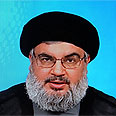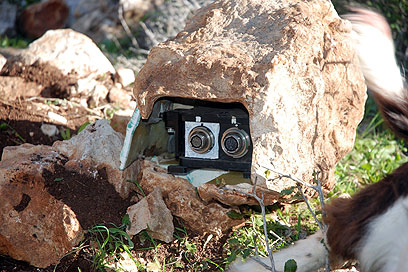
Israel would use a lot fewer cluster munitions in any future war with Hezbollah than it did in their 2006 conflict, even though it would go into southern Lebanon earlier and harder, a senior Israeli military officer said on Monday.
The disclosure confirms Israel already has detailed planning for an offensive aiming to avoid some controversial tactics used in the 34-day push against the Iranian-backed terrorist group.
Related stories:
- Report: Senior Hezbollah official flees to Israel
- Iran: Hezbollah drone proves our capabilities
- Hezbollah’s transformation
Israel has not signed the Convention on Cluster Munitions, whose adoption in 2008 was spurred partly by Lebanese casualties of the bomblets, some of which lay scattered and unexploded until they were accidentally detonated by civilian passersby.
"Due to a whole range of considerations – legitimacy, our non-indifference to the treaty, effectiveness and other factors – cluster use is expected to be reduced in combat in the rural areas," the officer told foreign journalists.

Hezbollah spying device (Photo: AP)
Speaking on condition of anonymity, he said "rural areas" meant "most of southern Lebanon". The scattering of cluster bombs, whether by artillery or the air force, would be "much reduced, significantly reduced", he said.
Hezbollah is outgunned by the technologically superior Israeli forces, but in 2006 it proved adept at fighting covertly and hitting Israeli towns with rockets. Some 1,200 people were killed in Lebanon, mostly civilians, and 160 Israelis, mostly soldiers, died in the war.
According to the top IDF official, international sanctions are forcing Iran to cut back aid to its Hezbollah, but the group remains potent force.
He said Hezbollah has an arsenal far larger and more sophisticated than it possessed in 2006.
Iran is a central factor in arming and training Hezbollah inside Lebanon and in camps in Iran, but the flow of aid has diminished compared to four or five years back, the military official said.
"Sanctions have hurt the amount of aid Hezbollah receives from Iran," he said, without providing evidence to back up his claims. He said aid remains a "significant amount," estimating it at hundreds of millions of dollars a year.
Future war to be settled fast
If Israel carries out its veiled threats to attack Iran's nuclear program, it could mean another war with Hezbollah.
Israel sees the Shiite terror group as the long arm of its enemy Iran. Israeli television has reported that 10,000 Lebanese sites are now listed as potential targets – far more than Israel had on its list in 2006.
Suggesting the depth of Israeli intelligence penetration, the officer said there was "more than one Hezbollah cell" in each of some 240 Shiite villages in southern Lebanon. Some have guerrilla bunkers, launch pads and arms caches.
Israel hopes Lebanon can rein in Hezbollah, which acts like a state within a state. If not, the officer predicted a future war would be settled more quickly by Israel, whose forces were fought to a standstill in 2006.
Israel had relied initially on aerial bombing, shifting to a ground offensive only after days of withering guerrilla rocket attacks on its northern towns. Next time, the tanks and troops would go in "very early on," the officer said.
Israel must also brace for attacks on Israelis abroad, he said. Iran and its Lebanese ally have been accused of several plots. Many may have been foiled, but on July 18 a bomb in Bulgaria killed 5 Israeli tourists. Iran denied any role.
Hezbollah has not responded to the charges of involvement.
If a bomb attack killed many Israelis, would Israel see it as justification for launching a new Lebanon war?
"My personal opinion? Absolutely," the officer said.
AP contributed to the report
- Receive Ynetnews updates
directly to your desktop















